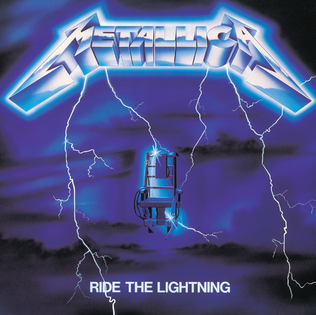
Ride the Lightning is the second studio album by the American heavy metal band Metallica, released on July 27, 1984, by the independent record label Megaforce Records. The album was recorded in three weeks with producer Flemming Rasmussen at Sweet Silence Studios in Copenhagen, Denmark. The artwork, based on a concept by the band, depicts an electric chair being struck by lightning flowing from the band logo. The title was taken from a passage in Stephen King's novel The Stand, in which a character uses the phrase to refer to execution by electric chair.
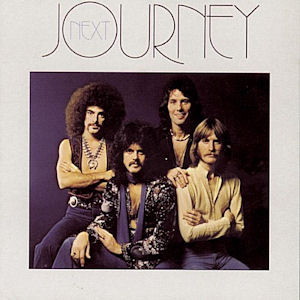
Next is the third studio album by Journey, released in February 1977. The band continued the formula from 1976's Look into the Future but this album also retains some of their jazzy progressive rock style from the first album. It is the last album to feature Gregg Rolie as the primary lead singer. "Spaceman"/"Nickel and Dime" was the single released from Next.

New Musical Express (NME) is a British music, film, gaming, and culture website and brand. Founded as a newspaper in 1952, with the publication being referred to as a 'rock inkie', the NME would become a magazine that ended up as a free publication, before becoming an online brand which includes its website and radio stations.

Slave to the Grind is the second studio album by American heavy metal band Skid Row, released on June 11, 1991, by Atlantic Records. The album displayed a harsher sound than its predecessor and lyrics that avoided hard rock cliches. Slave to the Grind is the first heavy metal album to chart at number one on the Billboard 200 in the Nielsen SoundScan era, selling 134,000 copies in its opening week. The album was certified 2× platinum by the Recording Industry Association of America (RIAA) in 1998 for shipping two million copies in the United States. It produced five singles: "Monkey Business", "Slave to the Grind", "Wasted Time", "In a Darkened Room" and "Quicksand Jesus". Skid Row promoted the album opening for Guns N' Roses in 1991 and as a headliner the following year.

Necroticism – Descanting the Insalubrious is the third album by British extreme metal band Carcass. It was released on 30 October 1991 through Earache Records. This album is the first to feature guitarist Michael Amott and marked the first time Carcass had recorded as a four-piece. Many of the tracks describe economical ways to dispose of dead bodies. Necroticism continues the move towards a predominant death metal sound which was started in Symphonies of Sickness, featuring songs with longer sections and complex structures, more akin to the then-burgeoning technical death metal subgenre.

Speed Metal Symphony is the first studio album by the American heavy metal band Cacophony, released in 1987 through Shrapnel Records.

Seventh Son of a Seventh Son is the seventh studio album by English heavy metal band Iron Maiden. It was released on 11 April 1988 in the United Kingdom by EMI Records and in the United States by Capitol Records. Like The Number of the Beast (1982) and later Fear of the Dark (1992), The Final Frontier (2010), and The Book of Souls (2015), the album debuted at number one on the UK Albums Chart. The lead single "Can I Play with Madness" was also a commercial success, peaking at No. 3 in the UK Singles Chart.

No Prayer for the Dying is the eighth studio album by English heavy metal band Iron Maiden. It is their first album to feature Janick Gers on guitar, who replaced Adrian Smith. Smith left the band during the pre-production phase, unhappy with the musical direction it was taking, and only having contributed to one song, "Hooks in You". This was the third song in the "Charlotte the Harlot" saga. Gers previously worked with singer Bruce Dickinson on his first solo album, Tattooed Millionaire, and had also worked with Ian Gillan, former Marillion singer Fish, and new wave of British heavy metal band, White Spirit.
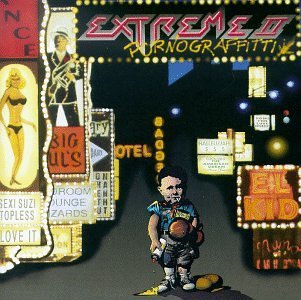
Extreme II: Pornograffitti is the second studio album by the heavy metal band Extreme, released on August 7, 1990, through A&M Records. The album title is a portmanteau of pornography and graffiti.

The Wire is a British music magazine publishing out of London, which has been issued monthly in print since 1982. Its website launched in 1997, and an online archive of its entire back catalog became available to subscribers in 2013. Since 1985, the magazine's annual year-in-review issue, Rewind, has named an album or release of the year based on critics' ballots.
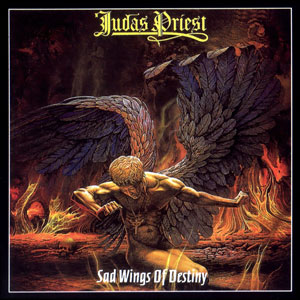
Sad Wings of Destiny is the second studio album by English heavy metal band Judas Priest, released on 26 March 1976 by Gull Records. It is considered the album on which Judas Priest consolidated their sound and image, and songs from it such as "Victim of Changes" and "The Ripper" have since become live standards. It was the band's only album to feature drummer Alan Moore.
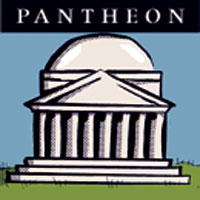
Pantheon Books is an American book publishing imprint with editorial independence. It is part of the Knopf Doubleday Publishing Group.
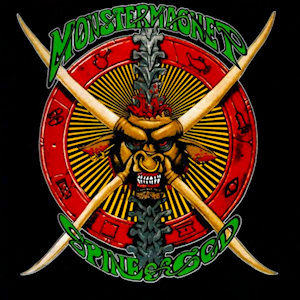
Spine of God is the debut studio album by American rock band Monster Magnet, released in Europe in 1991 and in the United States the following year. The album represents one of the earliest examples of the emerging 1990s sub-genre of stoner rock. Though Spine of God did not perform well commercially upon its initial release, the album was listed on Spin magazine's "Ten Best Albums of the Year You Didn't Hear" for 1991. The song "Medicine" was released as a single with accompanying music video.

The Human Factor is the fourth album by American heavy metal band Metal Church, released in 1991. It was the band's only release on Epic Records.
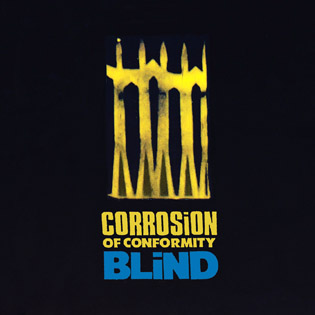
Blind is the third studio album by American heavy metal band Corrosion of Conformity, released on November 5, 1991 via Relativity Records. The album saw the band change their crossover thrash sound of the 1980s to a more straightforward metal sound.

Forest of Equilibrium is the debut studio album by British metal band Cathedral, released on 14 October 1991 on Earache Records. It is considered a classic of its genre, doom metal. Forest of Equilibrium was notably inducted into Decibel magazine's Hall of Fame in February 2006 being the 12th inductee for the Decibel Hall of Fame.

"Mississippi Queen" is a song by the American rock band Mountain. Considered a rock classic, it was their most successful single, reaching number 21 in the Billboard Hot 100 in 1970. The song is included on the group's debut album and several live recordings have been issued.
Martin Popoff is a Canadian music journalist, critic and author. He is mainly known for writing about heavy metal music. The senior editor and co-founder of Brave Words & Bloody Knuckles, he has written over twenty books that both critically evaluate heavy metal and document its history. He has been called "heavy metal's most widely recognized journalist" by his publisher.
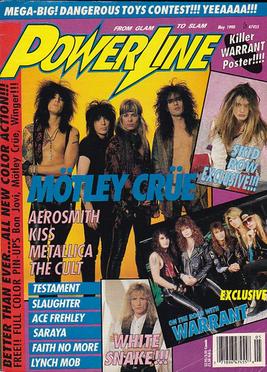
Powerline was a music magazine, covering the metal scene, published between 1985 and 1991.



















